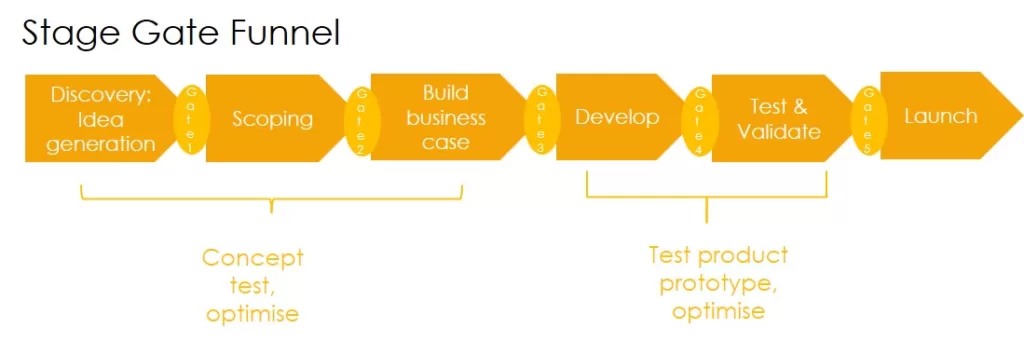The secret to the road of success for your idea

Consumers are the most powerful consultants to any company and the beauty of it is they like to get involved and collaborate with your future brand. Involving them will give your new idea a much higher chance of success as it hits the market.
Conducting surveys throughout the innovation funnel can offer several benefits to organizations. You give your users a chance to identify blockers long before you invest in a full-scale design and development. Asking users what changes they want to see and modifying the product early in the process means you won’t need to backpedal and make updates later.
Concept and product testing may feel like an added step to your product backlog. But integrating this step into your product development process actually saves you time, energy, and costs in the long run.
Concept testing is the secret weapon that industry giants like Procter & Gamble, Unilever, Nestlé, Lion, Coca-cola and many many more rely on to make informed decisions that lead to product success. In this article, we’ll dive deep into the world of concept testing and explore how it can revolutionize your FMCG business.
Stage-gate innovation process
A very popular development approaches adopted by many companies worldwide is called the innovation funnel or the stage-gate innovation process, adopting this process helps breaks product development into manageable bite size chunks.
Stage-gate innovation process emphasizes a structured and customer-centric approach to product development, ensuring that the product’s development aligns with real market needs and offers a clear path from initial idea to successful launch, and thereafter. This framework can help organizations mitigate the risk of building or launching products that do not resonate with users or have limited market potential.
Where would you adopt customer research survey in the process? Everywhere, and at every stage. It is important to note, consumer research survey is not just to do it once at the beginning of the project and take full charge and launch, it’s an iterative process at every checkpoint all throughout your product development or product refinement process – from idea, to development, to testing , to launching. Plus even after launch.

Consumer Insights Can Revolutionize Your Innovation Funnel
Conducting surveys throughout the stage-gate innovation funnel can offer several benefits to organizations engaged in the process of developing new products, services, or processes. The stage-gate innovation process typically involves a series of stages and decision gates, with each stage representing a specific phase of development and each gate serving as a decision point to determine whether to proceed to the next stage. Surveys can play a valuable role at various points in this process:
Concept Testing
Before investing significant resources in development, organizations can use surveys to test and refine product or service concepts. This ensures that the chosen concepts resonate with the target audience and have a higher likelihood of success.
Risk Mitigation
Throughout the stage-gate process, surveys can be used to identify potential risks and concerns that need to be addressed. This can help in adjusting the innovation strategy to minimize potential roadblocks.
Customer Feedback
Continuous surveys can help in gathering feedback from customers and stakeholders at various points in the innovation funnel. This feedback can inform ongoing development and refinement efforts, leading to a product or service that better meets customer expectations.
Stakeholder Engagement
Engaging internal and external stakeholders through surveys fosters a sense of involvement and ownership in the innovation process. This can lead to more effective collaboration and support for innovation initiatives.
Resource Allocation
Surveys can provide valuable data for decision-making at each gate, helping organizations allocate resources more effectively. By gathering input from various stakeholders, organizations can make informed decisions about whether to proceed to the next stage or to pivot or abandon a project.
Competitive Intelligence
Surveys can also be used to collect information about competitors, market trends, and emerging technologies. This information can be vital for adjusting the innovation strategy and staying ahead in the market.
To Wrap Up
In summary, conducting surveys throughout the stage-gate innovation funnel offers several advantages, including market validation, idea generation, risk mitigation, resource allocation, and alignment with strategic objectives. These benefits help organizations make informed decisions and increase the likelihood of successful innovation outcomes.
So pull out a chair for your customers at your next meeting, give them a voice, let them have say about your concepts and innovate together.
Make the smart choice for your FMCG business today and start harnessing the power of concept testing. By embracing this systematic and data-driven approach, you can unlock the potential for remarkable growth, improved customer satisfaction, and a stronger position in the ever-evolving world of FMCG. Don’t just guess what your customers want—know it, with concept testing.
